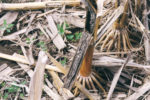Advertise Follow Us
Items Tagged with 'humic acids'
ARTICLES
Humics Emerging as a Tool to Increase Root Growth, Yields
Research by two USDA scientists finds that humic products can bring modest yield gains, especially during crop stress or in poorer soil types.
Read More
The Secrets of No-Till Yield Champions
No-tillers David Hula and Kip Cullers say spoon-feeding crops at the right time, intensive scouting, healthy soils and even emergence have helped them raise contest-winning corn and soybean yields.
Read More
A Biological Boost For Breaking Down Residue
Here’s a look at some of the products that could boost soil microbial activity and speed up decomposition of the toughest no-till residue.
Read More










